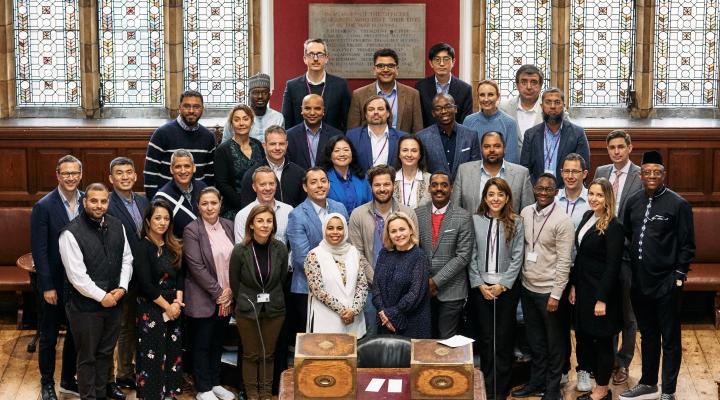Since the age of 15, I’ve always felt I’m not ‘the numbers guy’.
Maths was not my strong suit at school, and I’ve carried this with me throughout my life into my career. I managed to build a career which accepted this notion, but there were costs to this and limitations as a result. Since studying the Oxford Executive Diploma in Financial Strategy, I feel fully equipped with a toolkit of concepts and frameworks that I am confident executing practically in my organisation.
Here is the A-Z of my experience on the diploma programme.
A: Application
Why did I apply? I always felt that one of my weaknesses was my financial acumen: I’ve had several different roles in strategy, consulting and economic development, but a robust set of financial skills and advanced acumen seemed to elude me. I managed to have a whole career by side stepping around the finance part and I couldn’t do this anymore. I needed to develop these skills and the Diploma in Financial Strategy met my needs.
B: Benefits
The diploma equips you with a deep network, advanced insights into the areas of finance and strategy, the tools to succeed and a much more solid understanding of what business is all about. If you’re looking for an in-depth and enriching experience, you’ll find it here on this programme.
C: Confidence
As someone from a non-finance background, the diploma has given me the confidence to engage in the finance side of my work. I work with fund managers and before the programme I would focus exclusively on the strategy side, side-stepping around the finance elements of a project. This meant that I couldn’t engage as much as I wanted to and had to take all the finance inputs at face value. Now, I don’t have to necessarily lead the finance side of a strategy project, but I can still steer things, engage effectively in discussions and with the resources produced by my finance colleagues. I feel that I can add more value and that is exactly the result I was hoping for.
D: Dissertation
The dissertation process was one of the highlights. The strong alignment between my work and research meant that I could work on my Final Integrative Assignment (FIA) during my working hours and interview my peers to bring real-world context to my assignment. Being a researcher gave me the permission and freedom to ask questions that previously may have been difficult to ask in a work environment alone.
E: Executive MBA pathway
I’m now considering studying an Executive MBA at Saïd Business School, thanks to the great experience I had on the diploma programme.
F: Financial concepts – in detail
The second module looked at the theory and application of financial concepts in thorough detail. I found this module the hardest, but equally the most rewarding. Never in my life had I studied so hard! I asked so many questions because I didn’t understand the concepts initially, let alone how to apply them. By spending time with the finance professionals in my study group, really challenging ideas, getting their world view, and framing these concepts in everyday life, I was able to not only get to grips with the content, but reflect and allow myself time to embed my learnings.
G: Gaps to fill
Part of my decision to study the diploma was about me admitting to myself that there were gaps in my knowledge and it was time to address them. It was a vulnerable thing to do at this stage in my career, but the atmosphere at Oxford Saïd was that it’s ok. It’s ok to not know everything and it’s empowering to develop yourself.
H: Highlights
For me, the four main highlights of the programme were:
- The strategy module
- The theory and application of financial concepts
- My study group
- The dissertation process
I: In-depth knowledge and exposure
Personally, I think the main benefit is that you get a real in-depth exposure into two key areas – strategy and finance. You learn the science, theory and mechanics of how various frameworks and concepts operate and then how to apply them successfully in your organisation. In your thesis, the Final Integrative Assignment (FIA), you then combine the strategy and the finance elements and demonstrate your application of what you have learnt. The balance means that you are set up to successfully deliver your learnings and a return on investment in your organisation in real-time.
J: Not just an academic course
The School has been excellent at supporting me and equipping me with the skills to address these areas. The encouragement from faculty and my fellow peers alike is something that I think has made this programme so special and unique. It has been a real privilege to have had this learning opportunity in the middle of my career.
K: Knowledge and skill development
Through the programme, I’ve been able to build a solid understanding of financial concepts and how to implement strategies successfully. You begin by learning the theories, the science and mechanics, and then comparing these against practical case studies, the art of making things happen in practice.
L: Learning from each other
The programme is really aimed at two types of people – those who have a strong strategy background but need to develop their finance skills, or those with a strong finance background looking to build their strategic approach. Therefore, by studying this programme you are learning alongside other people who have real strengths in the areas that you are developing.
M: My academic director
Despite the impact of the pandemic on my cohort, the programme’s Academic Director, Ken Okamura, was really active in terms of giving us opportunities to engage with both the content and each other. He has been a great conduit for interactions, introducing me to other people and helping me to develop my network.




